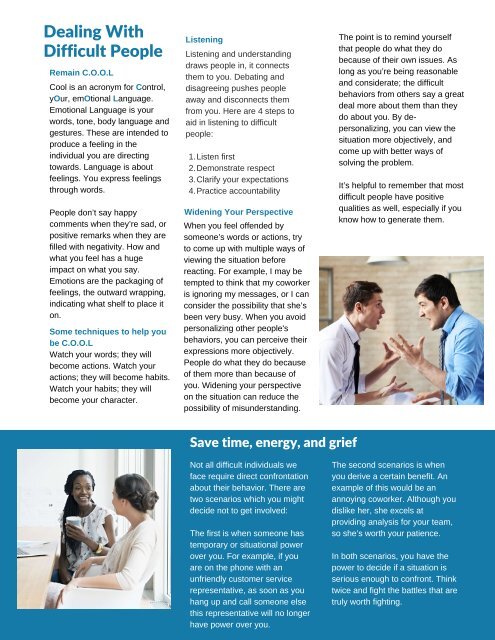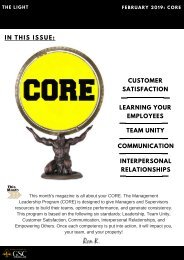Magazine_ October 2019
Finding and Hiring the Right People
Finding and Hiring the Right People
Create successful ePaper yourself
Turn your PDF publications into a flip-book with our unique Google optimized e-Paper software.
Dealing With<br />
Difficult People<br />
Remain C.O.O.L<br />
Cool is an acronym for Control,<br />
yOur, emOtional Language.<br />
Emotional Language is your<br />
words, tone, body language and<br />
gestures. These are intended to<br />
produce a feeling in the<br />
individual you are directing<br />
towards. Language is about<br />
feelings. You express feelings<br />
through words.<br />
People don’t say happy<br />
comments when they’re sad, or<br />
positive remarks when they are<br />
filled with negativity. How and<br />
what you feel has a huge<br />
impact on what you say.<br />
Emotions are the packaging of<br />
feelings, the outward wrapping,<br />
indicating what shelf to place it<br />
on.<br />
Some techniques to help you<br />
be C.O.O.L<br />
Watch your words; they will<br />
become actions. Watch your<br />
actions; they will become habits.<br />
Watch your habits; they will<br />
become your character.<br />
Listening<br />
Listening and understanding<br />
draws people in, it connects<br />
them to you. Debating and<br />
disagreeing pushes people<br />
away and disconnects them<br />
from you. Here are 4 steps to<br />
aid in listening to difficult<br />
people:<br />
1. Listen first<br />
2. Demonstrate respect<br />
3. Clarify your expectations<br />
4. Practice accountability<br />
Widening Your Perspective<br />
When you feel offended by<br />
someone’s words or actions, try<br />
to come up with multiple ways of<br />
viewing the situation before<br />
reacting. For example, I may be<br />
tempted to think that my coworker<br />
is ignoring my messages, or I can<br />
consider the possibility that she’s<br />
been very busy. When you avoid<br />
personalizing other people's<br />
behaviors, you can perceive their<br />
expressions more objectively.<br />
People do what they do because<br />
of them more than because of<br />
you. Widening your perspective<br />
on the situation can reduce the<br />
possibility of misunderstanding.<br />
The point is to remind yourself<br />
that people do what they do<br />
because of their own issues. As<br />
long as you’re being reasonable<br />
and considerate; the difficult<br />
behaviors from others say a great<br />
deal more about them than they<br />
do about you. By depersonalizing,<br />
you can view the<br />
situation more objectively, and<br />
come up with better ways of<br />
solving the problem.<br />
It’s helpful to remember that most<br />
difficult people have positive<br />
qualities as well, especially if you<br />
know how to generate them.<br />
Save time, energy, and grief<br />
Not all difficult individuals we<br />
face require direct confrontation<br />
about their behavior. There are<br />
two scenarios which you might<br />
decide not to get involved:<br />
The first is when someone has<br />
temporary or situational power<br />
over you. For example, if you<br />
are on the phone with an<br />
unfriendly customer service<br />
representative, as soon as you<br />
hang up and call someone else<br />
this representative will no longer<br />
have power over you.<br />
The second scenarios is when<br />
you derive a certain benefit. An<br />
example of this would be an<br />
annoying coworker. Although you<br />
dislike her, she excels at<br />
providing analysis for your team,<br />
so she’s worth your patience.<br />
In both scenarios, you have the<br />
power to decide if a situation is<br />
serious enough to confront. Think<br />
twice and fight the battles that are<br />
truly worth fighting.












